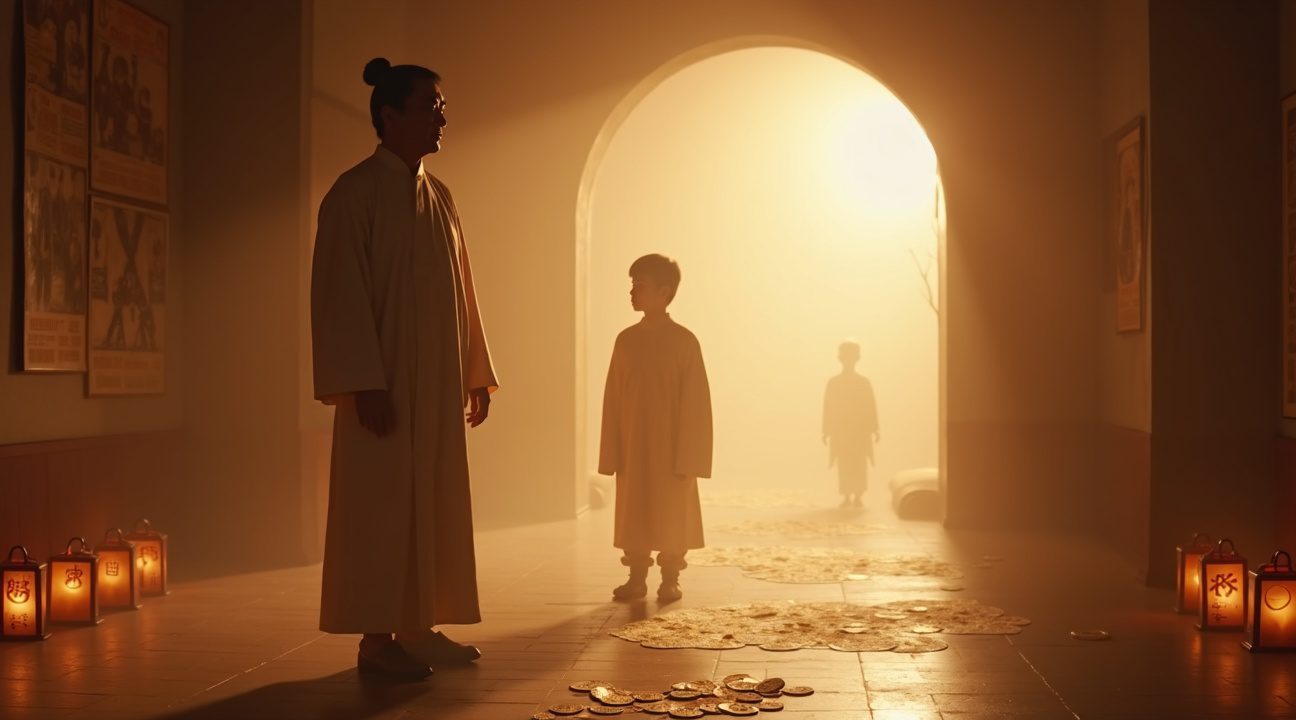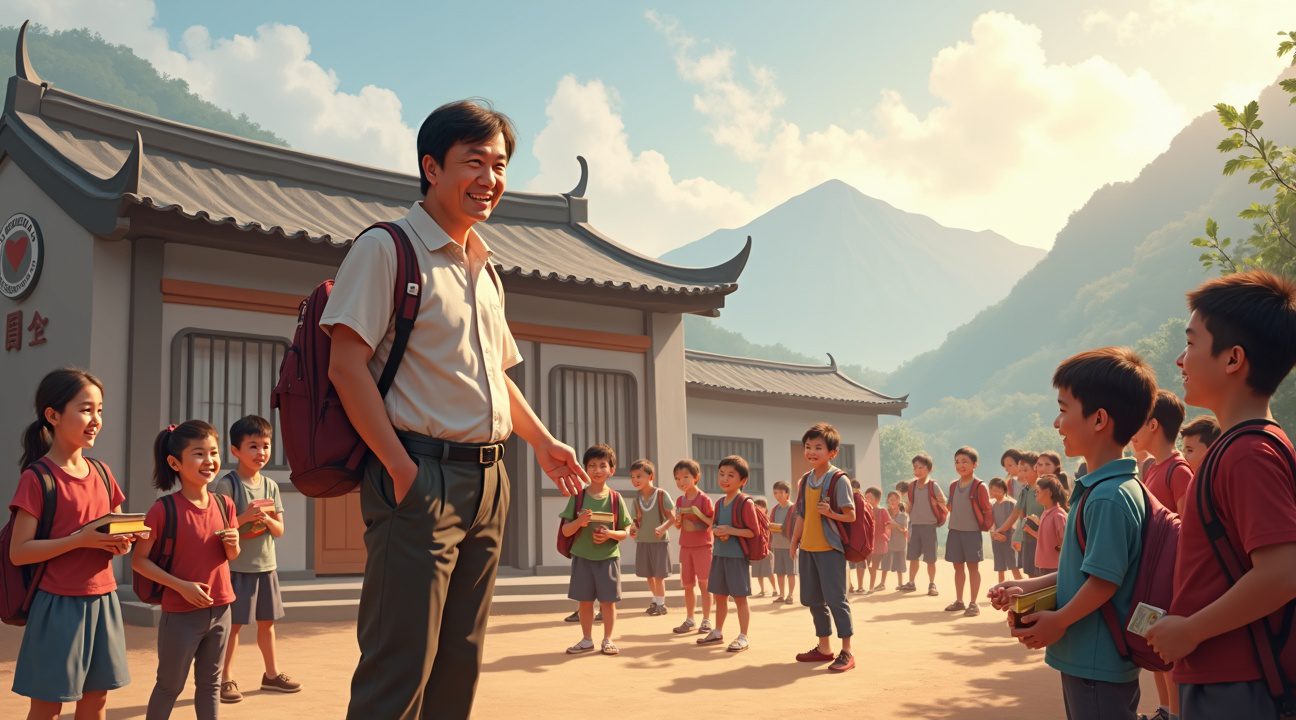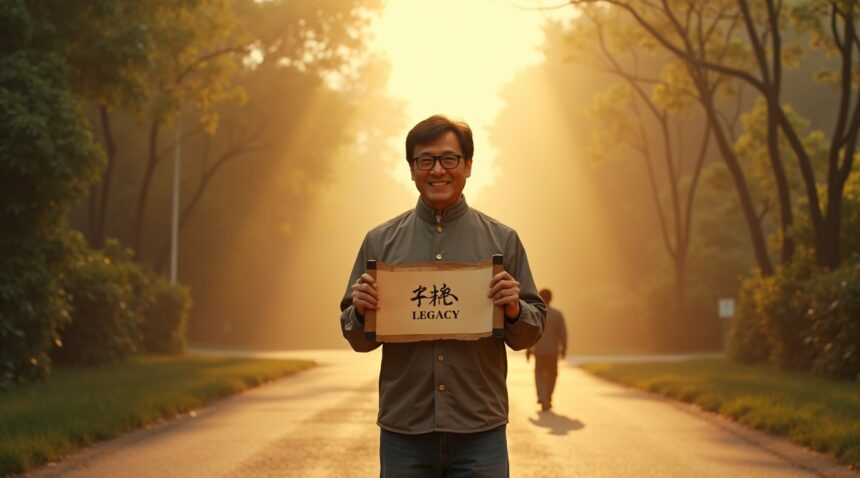Jackie Chan’s revolutionary decision to donate his complete $400 million fortune to charity instead of leaving it to his son Jaycee marks a dramatic shift from conventional wealth inheritance practices. The martial arts icon’s philosophy that his son should “earn his own money” has ignited worldwide conversations about family responsibility, character development, and the authentic meaning of legacy in contemporary society.
Key Takeaways
- Jackie Chan plans to donate his entire $400 million fortune to charitable causes instead of passing it down to his son, Jaycee Chan.
- Chan believes his son should build financial independence through personal effort, stating “If he’s capable, he can make his own money; if he’s not, then he will just be wasting mine.”
- The donation will support existing charitable foundations that focus on education, disaster relief, and healthcare infrastructure in underserved communities.
- His decision aligns him with philanthropists like Warren Buffett and Bill Gates, who prioritize charitable giving over family inheritance.
- Chan’s move has sparked global discussions on wealth responsibility and how families approach inheritance planning and value systems in a modern context.
Breaking Traditional Inheritance Norms
Chan’s stance represents a significant challenge to patterns historically followed by wealthy families. Rather than enabling dependency by passing down fortunes, the action star is forging a path that rewards merit and cultivates resilience.
Long-Standing Philanthropic Commitment
Throughout his life, Chan has shown dedication to philanthropy. His charity foundations have historically channeled resources toward:
- Educational initiatives that provide scholarships and infrastructure to underserved students.
- Disaster response programs offering emergency medical and logistical support.
- Healthcare development projects that build medical facilities and train staff in resource-deficient areas.
Aligning with Global Philanthropic Leaders
Chan’s approach echoes sentiments shared by other globally recognized philanthropists. For instance, Warren Buffett pledged to donate the majority of his wealth, and Bill and Melinda Gates have directed substantial funds toward social causes. These leaders support the view that inherited riches can detract from personal growth and accountability.
Reshaping Family Discussions on Wealth
Families around the world have begun rethinking how to secure their children’s futures. Financial advisors are seeing increased interest in:
- Educational trusts that facilitate learning and development
- Charitable contributions with long-term impact goals
- Scaled inheritances encouraging work ethic without fostering entitlement
Support from Jaycee Chan
Jaycee Chan has responded positively to his father’s decision, reflecting maturity and understanding. He is already building his own entertainment career, which validates Chan’s belief in personal responsibility and independent success.
Impact of Chan’s Charities
Chan’s philanthropic work targets key needs:
- Education: Funding scholarships and building schools in disadvantaged areas.
- Disaster Relief: Organizing emergency response teams and supplying aid during crises.
- Healthcare: Constructing clinics, distributing medical supplies, and training personnel in areas lacking adequate care.
Addressing Wealth and Social Responsibility
Amid rising income inequality, Chan’s commitment sets a new standard among wealthy figures. His decision demonstrates how influence and capital can be used to address systemic challenges and build stronger communities.
Inspiring a New Generation of Estate Planning
Financial consultants are noting a shift among wealthy clients seeking a balance between:
- Providing foundational opportunities such as education and career support
- Promoting self-reliance by limiting excessive financial safety nets
- Incorporating philanthropy as part of long-term legacy planning
Social Influence Through Visibility
With global attention focused on Chan, this bold move is contributing to a cultural shift in how wealth is perceived and passed on. Public discourse—fueled by social media—amplifies philanthropic decisions, increasing accountability and admiration for charitable legacies.
Is Complete Disinheritance Too Extreme?
Critics caution that removing inherited wealth entirely could burden heirs. However, Chan’s thoughtful planning—including providing quality education and life opportunities—suggests his intent is motivational, not punitive.
A Psychological and Cultural Ripple Effect
Children from affluent backgrounds may view this as a message: status comes with expectations of contribution and character. This shift could eventually reshape societal norms about leadership and privilege.
Global and Industry-Wide Reactions
Chan’s move is resonating across industries. Celebrities and public figures are reconsidering legacy planning, with some already expressing support and interest in similar philanthropic endeavors.
Academic and Financial Observations
Economists and psychologists studying wealth behavior see this as a case study in:
- Long-term family development through alternative inheritance strategies
- Generational change in financial attitudes and social responsibility
- Strategic legacy planning from an ethical and economic perspective
A New Era in Estate Services
Financial institutions are adapting to this paradigm. New services emphasize:
- Charitable donor-advised funds for ongoing impact management
- Family philanthropic involvement through advisory councils
- Tax-optimized giving strategies via estate structuring
Global Exposure Fuels Social Reflection
Thanks to Chan’s worldwide fame, his decision is initiating conversations far beyond China’s borders. Families in diverse regions are reevaluating definitions of legacy and moral leadership.
Legal and Logistical Considerations
To ensure effectiveness, Chan’s estate planning requires sophisticated legal structures. These strategies will help donated resources reach target causes efficiently while preserving donor intent and transparency.
Evolving Perspectives on Legacy and Fulfillment
Increasingly, accomplishment isn’t measured just in wealth, but in the scope of one’s positive societal impact. Chan’s vision sets a powerful example of this modern legacy model.
Educational Institutions Join the Dialogue
Schools and universities now reference Chan’s decision when teaching subjects like ethics, social entrepreneurship, and economics. Such real-life models help students explore meaningful career and life goals.
Lasting Impacts on Wealth Culture
Chan’s generous and values-based approach signals a cultural awakening. Personal choices—when driven by purpose—have the power to shape policies, economies, communities, and hearts. His example may inspire the next generation of leaders to embrace responsibility, self-reliance, and giving as cornerstones of a truly successful legacy.
For more on Jackie Chan’s charitable work, visit the Jackie Chan Charitable Foundation.
Why Jackie Chan is Donating His $400 Million Fortune Instead of Leaving it to His Son
Jackie Chan’s decision to donate his entire $400 million fortune to charity rather than leave it to his son Jaycee represents one of the most significant philanthropic commitments in entertainment history. The martial arts legend’s choice, originally reported by Parade in 2025, has sparked widespread discussion about wealth, family responsibility, and the nature of true legacy.
The staggering figure of $400 million underscores decades of success spanning action films, international partnerships, and business ventures. Chan’s wealth accumulated through blockbuster franchises, including his work in Rush Hour 4, merchandising deals, and global brand endorsements. Instead of viewing this fortune as a family inheritance, Chan sees it as a tool for broader social impact.
The Philosophy Behind Chan’s Decision
Chan’s approach stems from his belief that his son should create his own path to success. The actor has consistently emphasized that financial independence builds character and prevents the entitlement that often accompanies inherited wealth. His perspective challenges traditional expectations about family wealth transfer, particularly in cultures where passing down fortunes to children remains deeply ingrained.
The decision reflects Chan’s own journey from humble beginnings to international stardom. Growing up in poverty in Hong Kong, he earned every opportunity through discipline, hard work, and countless hours perfecting his craft. This experience shaped his conviction that meaningful achievement comes from personal effort rather than inherited advantages.
Multiple media outlets have echoed the original Parade report, highlighting how Chan’s choice aligns with his long-standing charitable activities. Throughout his career, he’s supported disaster relief efforts, children’s education initiatives, and wildlife conservation programs. His foundation work in China and internationally demonstrates a pattern of giving that extends far beyond this final donation commitment.
Public and Industry Reaction
The magnitude of Chan’s philanthropic pledge places him among celebrity donors who’ve chosen charity over family inheritance. His decision resonates particularly strongly given his global reach and influence across multiple generations of fans. The choice sends a powerful message about responsibility, privilege, and the role of wealth in society.
Chan’s relationship with his son Jaycee adds complexity to this decision. Their relationship has faced public scrutiny, particularly following Jaycee’s legal troubles in 2014. However, Chan has consistently maintained that his choice stems from principle rather than personal conflict. He believes that requiring his son to build his own success will ultimately benefit Jaycee’s character development and sense of accomplishment.
The entertainment industry has responded with mixed reactions to Chan’s announcement. Some colleagues praise his commitment to social causes, while others question whether completely disinheriting family serves anyone’s best interests. The debate reflects broader cultural tensions between individual achievement and family obligation.
Where the Fortune Will Go
Chan’s charitable focus spans multiple areas, including:
- Education
- Disaster relief
- Environmental protection
His foundation work has already demonstrated significant impact across Asia and beyond. The $400 million donation will dramatically expand these efforts, potentially affecting millions of lives through sustained philanthropic programs.
Legacy Beyond the Screen
The timing of this announcement coincides with Chris Tucker’s return for continued film projects, suggesting Chan remains actively engaged in his career while planning his legacy. His continued work in entertainment, including developments around the long-awaited sequel, demonstrates that philanthropy and professional achievement can coexist.
This decision positions Chan as a pioneer in celebrity philanthropy, choosing societal impact over traditional wealth transfer. His commitment to donating his entire fortune rather than a portion reflects an uncompromising approach to charitable giving. The choice will likely influence other wealthy entertainers to reconsider their own legacy plans and the balance between family provision and social responsibility.
https://www.youtube.com/watch?v=JTnT8oLlw3E
Chan’s Blunt Philosophy: “If He’s Capable, He Can Make His Own Money”
Jackie Chan’s decision to donate his entire fortune instead of leaving it to his son reflects a philosophy rooted in personal accountability and self-reliance. The action star has made his position crystal clear with a straightforward statement about his son Jaycee: “If he’s capable, he can make his own money; if he’s not, then he will just be wasting mine.” This candid approach reveals Chan’s commitment to principles that extend far beyond financial considerations.
The Foundation of Self-Sufficiency
Chan’s philosophy centers on the belief that true success comes through personal effort rather than inherited advantage. He views money as something that should be earned through dedication, skill development, and perseverance. This perspective challenges the conventional wisdom that parents should provide financial security for their children through inheritance.
The martial arts legend’s stance emphasizes several core values that have shaped his own remarkable career:
- Hard work as the primary driver of success
- Entrepreneurial spirit and risk-taking
- Personal responsibility for one’s financial future
- Character development through overcoming challenges
- Independence from family wealth as a measure of capability
Chan’s approach demonstrates his belief that struggle and effort build character in ways that inherited wealth cannot. He recognizes that financial comfort without effort often leads to complacency and missed opportunities for personal growth.
Breaking Traditional Wealth Transfer Patterns
Most wealthy individuals follow established patterns of passing assets to their children, viewing family legacy as a primary responsibility. Chan’s decision represents a significant departure from these traditional approaches. He prioritizes the development of his son’s character and work ethic over providing financial cushioning.
This philosophy aligns with Chan’s own journey from poverty to international stardom. His success came through years of rigorous training, countless injuries, and unwavering determination. The actor understands firsthand how financial struggles can motivate innovation and drive excellence. His Rush Hour success exemplifies how talent combined with hard work creates lasting achievement.
Chan’s stance also reflects concern about the potential negative effects of unearned wealth. He has observed how inherited fortunes can diminish motivation and create dependency rather than fostering independence. The actor believes that requiring his son to build his own success will ultimately benefit Jaycee more than any financial inheritance could.
The action star’s philosophy extends beyond simple wealth distribution. He views his decision as a teaching tool that communicates important life lessons about value creation, personal achievement, and social responsibility. By choosing charity over family inheritance, Chan demonstrates that success carries obligations to contribute to society rather than simply accumulating personal wealth.
This approach requires tremendous confidence in his parenting and his son’s abilities. Chan must trust that he has provided Jaycee with the skills, values, and opportunities necessary to succeed independently. The decision reveals his belief that proper upbringing and education matter more than financial inheritance.
Chan’s public statements about this philosophy serve multiple purposes. They set clear expectations for his son while also inspiring others to reconsider their own approaches to wealth and success. The actor’s transparency about his decision removes any ambiguity about his intentions and prevents future family conflicts over inheritance expectations.
His position reflects a broader trend among some wealthy individuals who question traditional inheritance patterns. These individuals argue that large inheritances can actually harm recipients by removing incentives for personal achievement and growth. Chan’s decision places him among celebrities and business leaders who prioritize character development over financial comfort for their children.
The philosophy also demonstrates Chan’s continued commitment to the values that drove his own success, even as he considers how to distribute the wealth that success has generated.

What This Means for Jaycee Chan’s Future and Family Legacy
Jackie Chan’s decision creates a profound shift in expectations for his son Jaycee Chan, who must now navigate his career without the safety net of inherited wealth. The younger Chan has already established himself in both music and acting, demonstrating that he possesses the drive to succeed independently. With no access to his father’s $400 million fortune, Jaycee faces the challenge of building genuine financial independence through his own talents and efforts.
This approach reflects Jackie’s commitment to instilling core values in his son rather than simply transferring wealth. By removing the option of financial dependency, the martial arts legend forces Jaycee to develop the same work ethic and determination that built the Chan family name. The decision sends a clear message that success must be earned, not inherited, regardless of family connections or resources.
Impact on Future Generations and Family Values
Jackie’s choice establishes a new precedent for the Chan family legacy that extends far beyond immediate financial implications. Future generations will grow up understanding that family wealth comes with responsibilities to society rather than personal entitlement. This paradigm shift may inspire other wealthy families to reconsider traditional inheritance models, particularly in entertainment industries where nepotism often overshadows merit.
The decision also transforms how the public perceives celebrity families and wealth transfer. While some might view this as harsh, others see it as a masterclass in parenting that prioritizes character development over material comfort. Jaycee’s response to this challenge will likely influence how other celebrity children approach their own careers and personal development.
Jackie’s stance contributes to broader cultural conversations about privilege, responsibility, and the true meaning of legacy. Rather than leaving behind material wealth, he’s creating a framework for meaningful contribution to society. This approach aligns with growing global awareness about wealth inequality and the responsibility that comes with substantial financial resources.
The entertainment industry will undoubtedly watch how this decision affects Jaycee’s career trajectory. Without the cushion of family wealth, every project becomes more significant, every career decision more consequential. This pressure could either drive exceptional achievements or create additional stress, but it guarantees that any success Jaycee achieves will be unquestionably his own.
Jackie’s philosophy challenges conventional wisdom about providing for children and suggests that the greatest gift parents can offer isn’t money but the tools and mindset needed for independent success. This bold approach may redefine how wealthy families think about inheritance and the responsibilities that come with significant financial resources.
Where the Money Will Go: Chan’s Extensive Charitable Work
Jackie Chan’s commitment to philanthropy stretches far beyond his recent announcement about leaving his fortune to charity. The action star has built an impressive track record of giving that spans decades, establishing himself as one of Asia’s most generous celebrities.
Chan draws inspiration from renowned global philanthropists Warren Buffett and Bill Gates, having previously pledged to donate at least half his wealth during his lifetime. This commitment reflects his deep-seated belief that wealth should serve a greater purpose than personal enrichment.
Foundations Making a Real Difference
The actor channels his charitable efforts through two primary organizations that target critical social needs:
- The Jackie Chan Charitable Foundation focuses on academic scholarships and disaster relief efforts, providing educational opportunities for deserving students while responding to emergency situations across the region.
- The Dragon’s Heart Foundation concentrates on building schools and improving healthcare infrastructure for children and elderly populations in China’s most impoverished areas.
These foundations have achieved measurable results that extend far beyond simple financial donations. They’ve established schools in underserved communities where educational resources were previously scarce or nonexistent. The organizations have also funded comprehensive educational programs that give disadvantaged children access to quality learning opportunities they wouldn’t otherwise receive.
Chan’s approach to philanthropy goes beyond writing checks. He actively participates as an advocate for educational and humanitarian causes, using his celebrity status to shine light on issues that might otherwise remain overlooked. His hands-on involvement demonstrates genuine commitment rather than superficial charity work.
The actor’s charitable philosophy aligns perfectly with his decision to exclude his son from inheriting his wealth. Chan believes strongly that individuals should create their own success through hard work and determination. This principle guides both his parenting approach and his philanthropic strategy.
His extensive charitable network has created lasting infrastructure improvements in rural Chinese communities. Schools built through his foundations continue operating years after construction, providing ongoing educational benefits to multiple generations of students. Healthcare initiatives have similarly created sustained improvements in medical access for vulnerable populations.
Chan’s influence extends beyond financial contributions through his role as a cultural ambassador for charitable causes. His public support for education and humanitarian efforts encourages other wealthy individuals to consider similar giving strategies. This ripple effect amplifies the impact of his personal donations.
The timing of Rush Hour 4 confirmation adds an interesting dimension to Chan’s charitable plans, as future earnings from the franchise will likely contribute to his philanthropic goals. His decision ensures that even his continued success in entertainment will ultimately benefit charitable causes rather than personal wealth accumulation.

How Chan’s Decision is Reshaping Global Conversations About Wealth and Inheritance
Jackie Chan’s announcement to donate his entire fortune instead of passing it down to his son has ignited worldwide discussions about how society views wealth transfer and responsibility. I see this decision as part of a larger cultural shift that’s challenging traditional notions of inheritance and legacy building.
Chan’s stance reflects a growing movement among the ultra-wealthy who believe that vast fortunes shouldn’t automatically flow to the next generation. His decision parallels choices made by Warren Buffett and Bill Gates, both of whom have committed to giving away the majority of their wealth through philanthropic initiatives. These high-profile cases are creating ripple effects that extend far beyond celebrity circles.
The Cultural Impact of Charitable Legacy Building
Media coverage of Chan’s decision has highlighted several key themes that resonate with people across different economic backgrounds:
- The value of earning one’s success rather than inheriting it
- The importance of contributing to societal causes over accumulating personal wealth
- The role of character development in shaping meaningful lives
- The responsibility that comes with significant financial resources
These conversations are particularly relevant as income inequality continues to grow globally. I notice that Chan’s approach has sparked debates about whether inherited wealth creates dependency or motivation in the next generation. His belief that his son should “earn his own money” challenges the assumption that parents should automatically provide financial security for their children.
The timing of these discussions coincides with broader societal questions about purpose and fulfillment. Younger generations increasingly prioritize experiences, social impact, and personal growth over material accumulation. Chan’s decision validates these emerging values while demonstrating that success can be measured by contribution rather than possession.
Financial experts and family counselors are taking note of this trend, as more families begin questioning traditional inheritance models. Some are exploring hybrid approaches that provide education and opportunities while still encouraging independence and self-reliance. Chan’s public stance has given legitimacy to parents who want to instill work ethic and personal responsibility in their children, regardless of their family’s financial status.
The global nature of this conversation suggests that Jackie Chan’s influence extends well beyond entertainment. His decision represents a philosophical shift that could reshape how future generations think about wealth, responsibility, and what constitutes a life well-lived. This evolving perspective may ultimately redefine success from accumulation to contribution, creating lasting changes in how families approach financial planning and values education.
Sources:
We the People San Diego, “Jackie Chan’s Bold Decision: Why His Son Jaycee Won’t Inherit His $400 Million Fortune”
Wikipedia, “Jackie Chan”
PlusTV Africa, “Jackie Chan To Leave His Estimated $370M To Charity Not For His Son, Jaycee | #WAYS”
YouTube Shorts, “Jackie Chan Disinherits Son: $400 Million to Charity …”
YouTube, “Jackie Chan plans to donate his $400M fortune to charity, and not pass it down to his son Jaycee”


